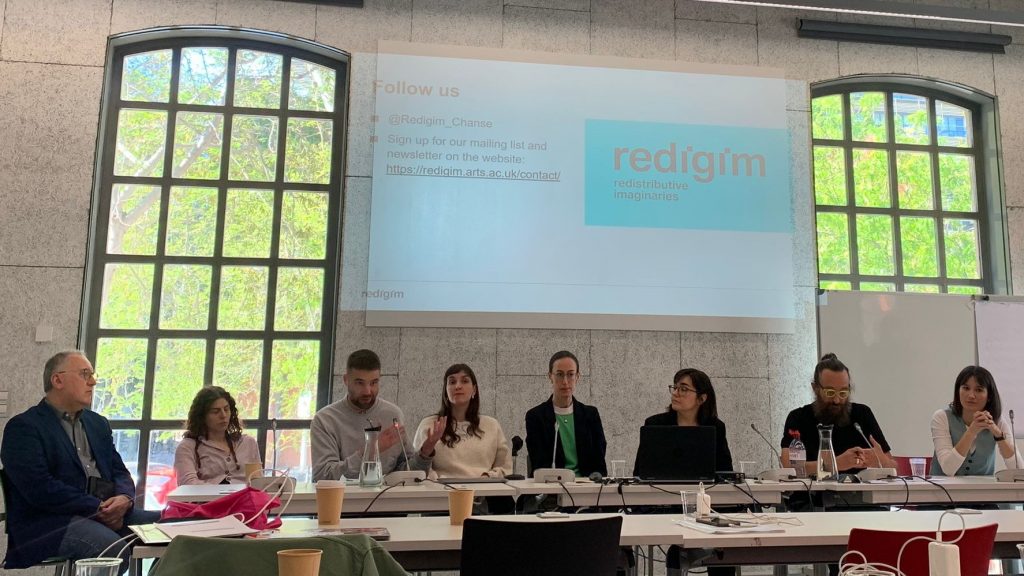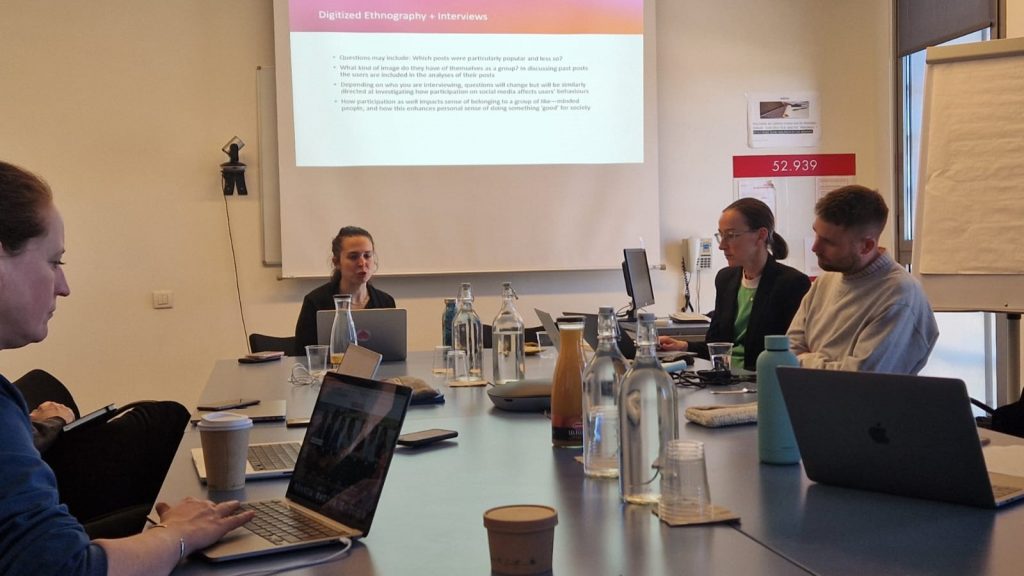
NEWS


NEWS
Published
Dr Kathrin Ottovay (Postdoctoral Researcher at the University of Zürich) gives an account of the second ReDigIm consortium meeting held on 18-19 April 2024 in Barcelona.

“We are talking about the welfare state today,” Professor Carlos Scolari (Pompeu Fabra University/UPF) sets out in his opening remarks as a commentator on our ReDigIm research group’s seminar presentation. “You know, I’m from Argentina,” Scolari continues, “if I were to talk about the welfare state in Argentina today, they would throw me out. So…”, he pauses, “this is very important.”
We are not in Argentina this sunny Friday morning, but in a seminar room in a converted brick factory building on the vibrant UPF campus in Barcelona. It’s the second day of our second ReDigIm consortium meeting (we held our first consortium meeting back in September 2023, but this is my first, as I’ve only recently joined the Swiss team as a post-doc researcher), and on this occasion the consortium ‘goes public’, facing colleagues and students as well as Olivier Schulbaum, founder of the Spanish team’s cooperation partner Platoniq/Goteo. We gather this Friday morning to reflect on our preliminary findings on the role of digital platforms in redistributive practices and imaginaries. The ‘imaginary’ is a concept we draw on to explore shared ‘semiotic systems’ that frame our lived experiences.
Investigating the interface
This morning, we can count ourselves lucky: not only for being able to have this important conversation, and not only for having the communication and digital media researcher Carlos Scolari as a commentator, but also for having him remind us of the urgency of the issues at stake. Pointing in the same direction, ReDigIm project leader Dr. Rebecca Bramall (University of the Arts London/UAL) states “we are at a critical moment for the understanding of collectively funded social systems”. Bramall moves onto further explain to the audience what the ReDigIm team is doing – and why. She explains how our international collaborative project explores the meanings and practices of redistribution in the context of digitalization. She points out, while the very idea of solidarity-based redistribution mechanisms through the welfare state is being called into question, we are also witnessing the spread of much more informal ‘prosocial’ practices of giving, sharing and donating, often aided through digital tools. “What is the relation between these two tendencies?” asks Bramall, referring to one of our main research objectives. She points to “a whole ecology of redistributive mechanisms” that our project takes into account – including taxation, but also philanthropy, mutual aid and charity – and adds another key research question: “How is the digital shaping the understanding of these practices?”.
As Professor Mercè Oliva (UPF Barcelona) goes onto explain, ‘the digital’ (in the form of digital platforms set up to enable citizens to crowdfund, support or ‘boost’ causes, and to help others in need) has been the main research focus of the five international ReDigIm teams in recent months. In ReDigIm, she elaborates, we understand digital platforms discursively and materially and in terms of ‘interfaces’, asking how they shape connectivity, what messages they contain and what stories they tell (and don’t tell) and what political economy mechanisms are at work. “Interfaces are political devices – every technology is” emphasizes Professor Carlos Scolari. He reminds us to study digital affordances by asking “what they invite me to do”, including the emotional dimension and the production of desire.

Based on their analyses of the digital platforms, the teams present some key themes to the seminar audience: how the platforms’ objective of empowering communities is reflected in technical features (Dr. Jonathan Paylor, UAL/UK), how ‘doing good’ on the platform is articulated with tropes of choice and consumerism (MA Julia Weisz, UZH/Switzerland), and how transparency comes to play a role as an assigned feature of the digital (Dr. Milana Cergic, JGU/Montenegro). Drawing on interviews she conducted with platform founders and developers, Dr. Isabel Villegas Simón (UPF/Spain) broadens the view to the tensions around the digital and its perceived (dis)connection to offline activities.
Looking ahead
To be sure: in the midst of our analytical work, and halfway through the CHANSE-funded project, there is already much to offer – as well as much to scrutinize further and to debate with academic and non-academic stakeholders. While Carlos Scolari calls for a critical genealogy of crowdfunding platforms, hinting to e-commerce and auction sites as their predecessors, Goteo founder Olivier Schulbaum points towards the possibilities for deliberative democracy and open data. He foregrounds Goteo as a platform for participation and political experience, and positions crowdfunding as a “Trojan horse” for reinventing the commons (“…installed on the logic of this flawed economic system that surrounds us, it can contribute to change from within”, as Platoniq puts it).
It will be an exciting challenge over the coming months to explore the tensions indicated by these two exemplary statements and to learn more about the role(s) and perceptions of the welfare state(s). In the seminar, the question of how the welfare state might be reconfigured in the wake of digital prosocial practices is also put on the table by Olivier Schulbaum. He reminds us that Goteo was born in Spain out of the 2008 economic recession and austerity crisis. In order to be able to cooperate with public institutions, Platoniq developed a groundbreaking scheme for matchfunding civic projects on Goteo with public funds, thus making public administrations “trust the criteria of the citizen”.

It is precisely to these citizens – the people who actually use and make sense of platforms to help, share, (re)distribute and/or “make the world a better place” – that we will turn to in the next phase of our research project. In the upcoming work package three, we will explore how they engage with and make sense of digitally-mediated forms of prosocial contribution in their everyday practice.
Invisible labor and ham
In the seminar, Dr. Rebecca Bramall raises the question of how much work and invisible labor goes into managing campaigns like the crowdfunding projects we just learned about. Likewise, the amount of invisible work that goes into organizing such a productive and enjoyable meeting – including an inspiring tour of the UPF ‘Art Track’ at Campus Ciutadell (by MA Ona Anglada-Pujol/UPF) – by the whole UPF team cannot be underestimated and appreciated enough. And, I must add, the amount of (delicious) food that kept us going. It is telling that Professor Mercè Oliva opened our first days’ workshop by saying: “We had coffee. We had jamón. Now we can start!”. And having mentioned coffee and jamón, I now can close this blog post.